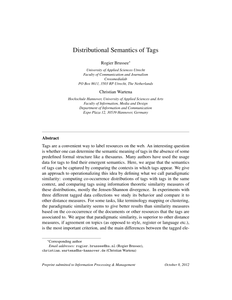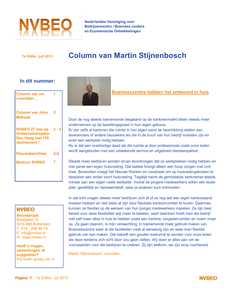The scientific approach is full of paradoxes. Our need for (more) certainty (knowledge) and control is also greatest where our lack of insight is also greatest. And that is precisely in economics, education, and the social sciences. Usually it isn 't in natural science. Pointing out the unscientific nature of econometrics (models only work if nothing really changes, which of course is never the case) is too easy, certainly from the ivory tower of the natural sciences. In the meantime, physics has proven that more insight certainly does not always lead to wiser action and a better world...
MULTIFILE

Paper presented on a congress in 1997 on fesival management. It gives a description of my very first econometric model on economic impacts of festivals.
DOCUMENT
Preprint submitted to Information Processing & Management Tags are a convenient way to label resources on the web. An interesting question is whether one can determine the semantic meaning of tags in the absence of some predefined formal structure like a thesaurus. Many authors have used the usage data for tags to find their emergent semantics. Here, we argue that the semantics of tags can be captured by comparing the contexts in which tags appear. We give an approach to operationalizing this idea by defining what we call paradigmatic similarity: computing co-occurrence distributions of tags with tags in the same context, and comparing tags using information theoretic similarity measures of these distributions, mostly the Jensen-Shannon divergence. In experiments with three different tagged data collections we study its behavior and compare it to other distance measures. For some tasks, like terminology mapping or clustering, the paradigmatic similarity seems to give better results than similarity measures based on the co-occurrence of the documents or other resources that the tags are associated to. We argue that paradigmatic similarity, is superior to other distance measures, if agreement on topics (as opposed to style, register or language etc.), is the most important criterion, and the main differences between the tagged elements in the data set correspond to different topics
DOCUMENT

Vast empirical evidence underscores that exporting firms are more productive than non-exporters. As governments accordingly pursue export-promoting policies we are interested in the firmness of these conclusions with respect to African small and medium sized enterprises (SMEs) and the influence of the destination of export trade. Using a micro-panel dataset from five African countries we confirm the self-selection. We apply propensity scores to match exporters and use a difference-in-difference methodology to test if African SMEs experience productivity gains because of export participation. Results indicate that African firms significantly learn-by-exporting. Manufacturers obtain significant performance improvements due to internationalization although this effect is moderated by export destination. Firms that export outside Africa become more capital intensive and at the same time hire more workers. In contrast we find evidence that exporters within the African region significantly downsize in capital intensity. Results regarding skill-bias of internationally active firms are mixed, where exporters within the region expand in size and hire more relatively unskilled workers.
LINK
Purpose: Whereas investments in new attractions continue to rise within the theme park industry, knowledge regarding the effects of new attractions on theme park performance and attendance remains scarce. In order to isolate these effects, the purpose of this paper is to present the results of an econometric study explaining the variance in theme park visitor numbers and quantifying the effects of new attractions on theme park attendance. Design/methodology/approach: The paper is based on an econometric study, in which models were produced for four European theme parks. No pooled modelling was used, meaning that four different models were created; one for each participating theme park. Various variables affecting theme park attendance were identified and quantified, and subsequently the effects of new attractions on visitor numbers were isolated. Findings: Findings indicate that all new attractions opened at Park D during the research period have had a positive long-term influence on attendance. This positive influence lasted for no more than two years. No significant short-term influence was found. There were significant differences in effect between new attractions which could not yet be explained. Research limitations/implications: The research by design only takes into account the economic effects of new attractions and disregards all environmental and socio-cultural effects. Even though the research provides an accurate approximation of the effects of new attractions on attendance, this effect should, according to the author, not be perceived as a stand-alone effect yet as a part of a complex system. A situational approach taking into account several other situational as well as qualitative factors would do the complex reality more justice than a, even though effective, simplified and general approach. Practical implications: Industry operators can now use the econometric model presented in this paper to determine the effects of new attractions on their theme park's attendance and use this knowledge to further fine-tune their investment policy. Originality/value: The paper presents the first econometric model successful at isolating and quantifying a new attraction's effect on theme park attendance and can thus be a valuable tool in perfecting one's investment policy. The paper furthermore includes a brief introduction to a situational approach of determining a new attraction's effects on theme park performance.
LINK
Artikel voor SportNext over verklaring van de Nederlandse topsportsuccessen op de Olympische Winterspelen van Sotsji 2014 vanuit een economisch en sociologisch perspectief.
DOCUMENT

Column van Martin Stijnenbosch in de nieuwsbrief van NVBEO (Nederlandse Vereniging voor Bedrijvencentra/Business centers en Economische Ontwikkelingen. 7e Editie - juli 2013
DOCUMENT

This study examines completion rate for a self-assessment survey designed to assess employees' digital skills levels in the workplace. The aim is to improve data quality by investigating completion of the survey. The study reviews the theoretical background related to self-assessment surveys and completion rate, and explores the influence of survey length and format in survey design on completion rate. The research design and data analysis are described in detail, with a focus on identifying factors that may influence completion rate. Results suggest that survey designers should consider using Likert scales to optimize completion rate and completion time. However, this study did not find a significant increase in completion rate as a result of motivation, which was claimed from the literature. The study concludes with implications for the design and implementation of self-assessment surveys in the workplace, including the importance of reducing length and complexity of survey items and questions.
DOCUMENT

Vleierij is een van de oudste en meest gebruikte manieren van overtuigen. Binnen de sociale psychologie is er veel onderzoek naar gedaan. Vleierij blijkt vaak te werken. Veel studies tonen aan dat degene die de vleierij ontvangt, de vleier veel positiever beoordeelt. Mensen hebben een primaire behoefte aan waardering en een compliment geeft invulling aan deze behoefte.
LINK